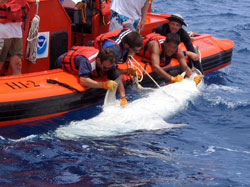
In a newly published study, NCCOS researchers link sharks and other top predators with primary producers (benthic algae) in pristine, healthy coral reef ecosystems. ‘We used chemical signatures of carbon and nitrogen found in the tissues of the algae, invertebrates, fish, and sharks from thePapahanaumokuakea Marine National Monument (PMNM) to trace the extent benthic algae influences the food chain of healthy coral reef ecosystems, dominated by apex-predators like sharks,’ said Dr. Carolyn Currin, NCCOS scientist and lead co-author on the study.
Remote healthy coral reefs, like those found in the PMNM, are uniquely dominated by large numbers of apex predators, includingcarnivorous sharks, jacks, and snapper. Like all coral reefs, the PMNM is supported by photosynthetic algae.
‘Anything affecting native algal species, such as sedimentation, dredging, or the spread of non-native invasive algae, will ultimately impact the abundance of prized food fish such as snapper or jacks,’ said Randall Kosaki, NOAA Deputy Superintendent of Papahanaumokuakea and a co-author on the study. ‘Taking care of the reef itself will help to ensure healthy fish populations.’
This study was a collaboration between researchers from NOAA’s National Centers for Coastal Ocean Science and PMNM of the Office of National Marine Sanctuaries.
For more information contact:Anna.Hilting@noaa.gov.
